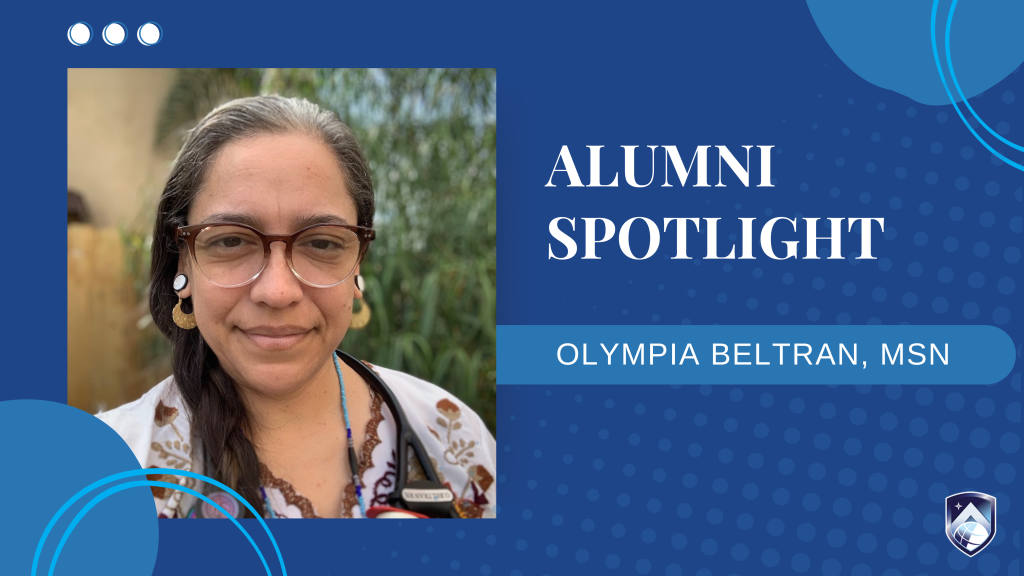As we close out 2023, Aspen is celebrating the many accomplishments of our students. One of those students, Olympia Beltran, RN-MSN Public Health, was the winner of Aspen University’s 2023 Commencement Speaker Contest. Olympia shared her words of wisdom with our Commencement attendees at the October 2023 ceremony in Phoenix, Arizona. Keep reading to be inspired by Olympia’s journey.
“Thank you for this incredible opportunity; please let me take a moment to introduce myself in my traditional indigenous language: Inepo Olympia Andrade Beltran, teak. Nepo tributa Yoemem Kombicha Californiapo betana, intok Mut Tipaipo joak. My name is Olympia Andrade Beltran. I am from the Yaquis of Southern California tribe and live in Kumeyaay territory. I am a recent graduate of Aspen University’s RN-to-MSN bridge program with an emphasis in public health. I recognize that accomplishing this goal is a great privilege, as only 4.8% of indigenous adults hold graduate degrees and Native Americans comprise a mere 0.5% of the RN population in the United States. My primary motivation for being a nurse is to provide high-quality, culturally competent care to my community. I would like to share how I arrived at the decision to pursue graduate study, the primary focus of that study, and the significance the study holds for my people.
A few months before the announcement of a novel virus that would change the world as we knew it, my eldest son was diagnosed with hypertension. A month after that, my own A1c level came back elevated. Several of my tribal members were discussing their challenges in controlling blood pressure and blood serum glucose as well as cholesterol levels. Our most recent Yaqui language course had just ended, and the language instructor and I were discussing the relationship of language reclamation to the mental health of indigenous peoples. All of these events got me thinking about what contribution I could make as a nurse to my own tribal community, and the health concerns that we face collectively. It was at that point that I decided to apply for the RN-to-MSN with emphasis in public health program. My goal was to learn the components of a master’s level nursing education and apply this knowledge towards the creation of a project that would result in improved health outcomes for my tribe. Working in public health, I observed firsthand how social determinants of health, historical trauma, colonial diet, and sedentary lifestyles correlated with hypertension, elevated A1c’s and cholesterol levels. I understand that dissociation from traditional lands, (fishing, hunting, and foraging spaces), cultural practices, and spiritual traditions have observable negative effects on health outcomes. I decided to focus my studies on one aspect of Yaqui traditional diet and promote health through the process of reclaiming our relationship with that particular food medicine.
Huitlacoche mushrooms are known among culinary circles around the world. Huitlacoche is a Mexican delicacy, known by my people as huivisim. Huitlacoche has been used in Mexican indigenous cuisine for thousands of years as an ingredient in traditional dishes like tamales and stews. Through my coursework at Aspen University, I was given the space and time to review literature on the health benefits of huitlacoche and create a culturally competent educational presentation to facilitate the reclamation of this food, to re-learn our Yaqui language associated with the food and its preparation. Participants gain a deeper understanding of this food and receive practical teachings on how to incorporate it into their diet. The research that I was able to conduct through my coursework at Aspen University has helped my community immensely, and we are continuing to expand on this work by further identifying additional health-promoting foods.
The success of this project was made possible because of the accessibility that the Aspen University educational environment has provided. Being able to work full-time and complete academic tasks after work and on weekends was the key to my course completion. My advice to my fellow graduates as we go out into the world empowered with our new credentials, is to identify the social determinants which impede the health and wellbeing of marginalized people and tackle them head-on. The integrity, honor, and substance of our Aspen University education lies in what we choose to do with it.”

